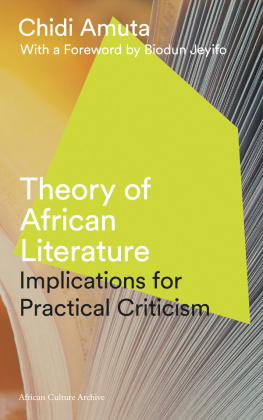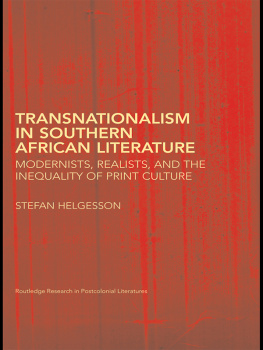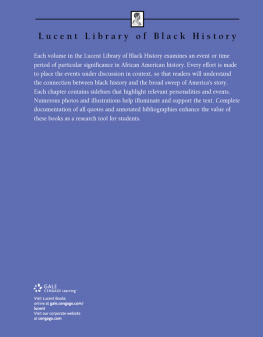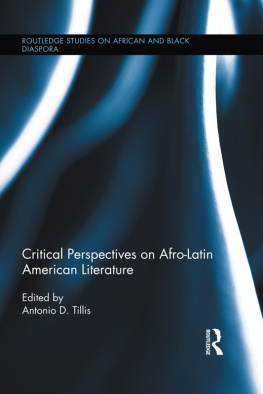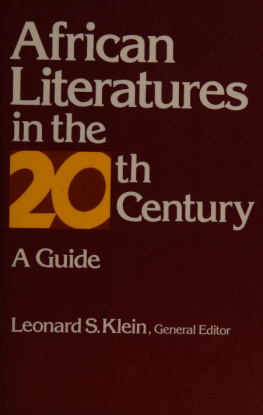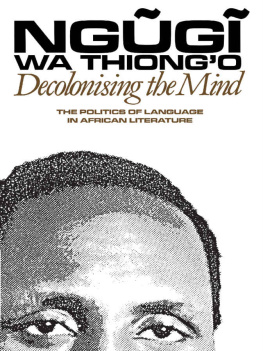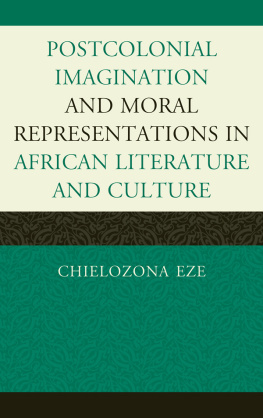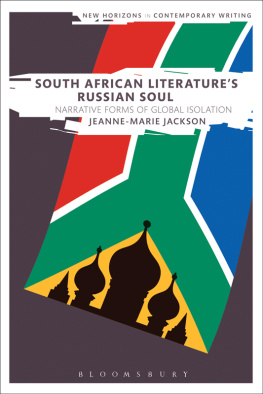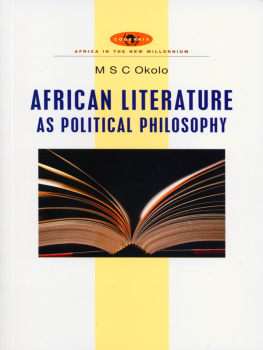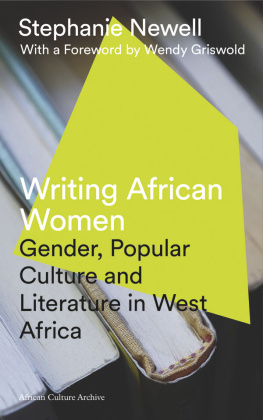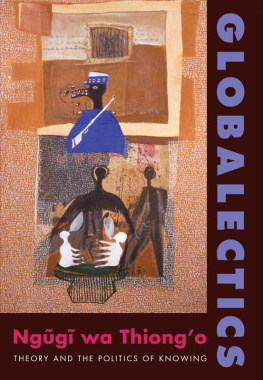
African Culture Archive
Over the past forty years, Zed has established a long and proud tradition of publishing critical work on African issues, offering unique insights into the continents politics, development, history and culture. The African Culture Archive draws on this rich backlist, consisting of carefully selected titles that even now have enduring relevance years after their initial publication. Lovingly repackaged, with newly commissioned forewords that reflect on the impact the books have had, these are essential works for anyone interested in the cultural and literary landscape of the continent.
Other titles in the archive:
Land, Freedom and Fiction: History and Ideology in Kenya
David Maughan-Brown
Theatre and Cultural Struggle under Apartheid
Robert Mshengu Kavanagh
Writing African Women: Gender, Popular Culture and Literature in West Africa
ed. Stephanie Newell
About the author
Chidi Amuta is a leading Nigerian intellectual, literary critic, journalist and public affairs consultant. He has taught literature and communications at the Universities of Ife and Port Harcourt. In addition to interviewing world leaders like Margaret Thatcher, Francois Mitterand, Robert Mugabe and Yoweri Museveni, he has written articles and columns in several newspapers in Nigeria and the United States. He previously served as chairman of the editorial board of The Daily Times and managing director of The Post Express , and is currently the chief executive of Wilson & Weizmann Associates, a media and public affairs consultancy based in Lagos.
Biodun Jeyifo is a professor of African and African American studies and of comparative literature at Harvard University. His previous books include Wole Soyinka: Politics, Poetics, Postcolonialism (2004).
Theory of
African
Literature
Implications for Practical Criticism
Chidi Amuta
With a new Foreword by Biodun Jeyifo

Zed Books
LONDON
Theory of African Literature: Implications for Practical Criticism was first published in 1989 by Zed Books Ltd, The Foundry, 17 Oval Way, London SE11 5RR, UK
This ebook edition was first published in 1989
www.zedbooks.net
Copyright Chidi Amuta 1989
Foreword copyright Biodun Jeyifo 2017
The right of Chidi Amuta to be identified as the author of this work have been asserted by him in accordance with the Copyright, Designs and Patents Act, 1988
Cover design: Kika Sroka-Miller.
All rights reserved. No part of this publication may be reproduced, stored in a retrieval system or transmitted in any form or by any means, electronic, mechanical, photocopying or otherwise, without the prior permission of Zed Books Ltd.
A catalogue record for this book is available from the British Library
ISBN 978-1-78699-068-6 hb
ISBN 978-1-78699-006-8 pb
ISBN 978-1-78699-004-4 pdf
ISBN 978-1-78699-003-7 epub
ISBN 978-1-78699-005-1 mobi
For Wamanu and Ihueze Amuta
Husband and wife
Who in faith
Sent me into this great unknown
And for Tosin
who made the great crossing
Then
And to my teachers, students, friends
and colleagues
with whom in dialogue
I travelled this lonely road long ago
Contents
Foreword by Biodun Jeyifo
In 1989 when Theory of African Literature was first published, I had very close relationships with both Chidi Amuta, the author, and Zed Books, the publisher. From the early to mid-1980s, I had been Chidis teacher at the University of Ife in Nigeria and had in fact supervised both his masters thesis and doctoral dissertation. The latter was a comprehensive study of writings in all literary genres on the NigeriaBiafra war. Chidi was one of the brightest students I ever taught at both the undergraduate and postgraduate levels. In saying this, I am including universities around the world where I have either taught full-time or as a visiting professor or served as an external examiner in North America, South Asia and China. Beyond the formal, institutional context of our relationship, I was also close to Chidi on a personal level, so much so that I was the unofficial best man at his wedding to the woman to whom this book is dedicated. On the basis of the diverse aspects of our relationship, I think I can lay claim to having been quite influential in bringing our author into the radical political and intellectual circles in Nigeria through which he encountered Marxism, which, as the reader of this book will quickly discover, is at the intellectual heart of Theory of African Literature .
Zed was of course much farther away in London. But it always had a profound interest in the political and intellectual affairs of the African continent as part of its vigorous and self-defining internationalist and global perspectives. If my memory and the literal facts of the sources of this African connection are correct, Zed was in part founded by Marxists and revolutionaries in exile from apartheid South Africa at a time when it seemed that liberation from that racist and super-exploitative system was nowhere in sight. I forget now whether it was Zed that first contacted our movement in Nigeria or the other way round, but by the time this book was published in 1989, the offices of Zed had become a regular, perhaps even mandatory, port of call for me anytime I passed through London. Indeed, I have warm memories of long discussions with Robert Molteno and Roger van Zwanenberg, both of whom were decisive in bringing into being the vibrant publishing outfit of the left that Zed quickly became shortly after its founding. I was so appreciative of all that the press was able to achieve especially with regard to its profound interest in radical and progressive developments and possibilities in Africa around 1986 that I agreed to write a book on Ngugi wa Thiongo, which was also to be the first in a series that I would edit on Marxism and African literature. Sadly, neither the book nor the series ever materialized, in no way due to a loss of interest on the part of Zed.
So, when both the author and the publisher approached me to write the Foreword to this edition of the book, I was both willing and eager. In the pages of this book, that context of a vibrant radical and progressive movement in African politics and letters is extensively explored. Ibadan, Ife, Accra, Nairobi, Dakar, Johannesburg and Nsukka were brimming with debates, exchanges and even quarrels over theory and praxis in the production and reception of African writings, together with the pedagogical and ideological uses to which they were being put, and Zed was one of the few publishers anywhere in the world that showed an interest in these African expressions of what was a truly global ferment.
In providing this background that I shared with both the author and the publisher, my purpose is not nostalgia. Far from it; my purpose is in fact to provide the basis for a brief reflection on the kind of theory that the reader will encounter in this book, which is itself about theory. My hope is that such contextualized reflection will demonstrate that this book, first published nearly three decades ago, is in many respects still very relevant to the present period, which, to many scholars, is post-theoretical.
Broadly speaking, there are two radically opposed views of what social, cultural or literary theory is and how it generates and achieves relevance or impact. First, there is the view that theory is a second-order production of explanation and illumination of an event, a phenomenon or a period of history whose time has passed. That passage of time is deemed necessary for generating theory, because those living, acting and emoting about an event or a phenomenon cannot be sufficiently distanced from it to obtain valid theoretical understanding about it. On this account, Edmund Burkes Reflections on the Revolution in France provides us with a model of the most useful way to gain theoretical understanding of that outstanding conjunctural event in modern European and world history because it was written, and it could only have been written, after the last shot had been fired. The same thing has been said of Hegel in The Phenomenology of Spirit with regards to the famous MasterSlave dialectic thesis at the heart of the book: the slave revolts in Haiti had to have taken place for the German philosopher to extract from the struggle to the death of the slaves a theory of the primacy of slave rebellion over any freedom that the Master, the slave-owner, is willingly or reluctantly moved to grant his slaves.
Next page
